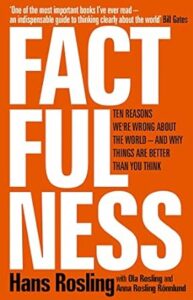Have you considered how your instincts influence your decision-making around retirement planning?
Our natural instincts and biases create frameworks that lead our perspectives on how we think the world works.
These frameworks influence our decisions surrounding our financial decisions.
On this episode we discuss how to build prosperity by analyzing and identifying your default financial perspective. Listen in to learn 10 instincts identified by the book Factfulness and what you can do to combat the biases they lead to.
How Is Your Perspective Affecting Your Decisions?
Have you changed your retirement timeline?
Or delayed a big purchase because you weren’t confident that you could swing it?
Or adjusted your investment strategy based on a political or economic event?
Like it or not, our biases affect our financial decisions.
Instincts to Watch Out For
 We need to combat several instincts to ensure sound financial decision-making actively.
We need to combat several instincts to ensure sound financial decision-making actively.
The gap instinct contributes to us vs. them thinking. Rather than considering the economic world in two categories–developed vs developing–we can further separate economic levels into 4 categories. Remembering this can help you shift your financial perspective.
The negativity instinct is a trap we all fall into. We come to expect bad news and think things are getting worse. Gapminder is a helpful tool to help us reframe our perspectives.
Our fear instinct is hard-wired and stems from our brain’s role in keeping us safe from danger. This instinct can lead to an irrational fear of losing it all. Rather than acting rashly, when you fear running out of money try delaying decision making until your panic subsides.
Beware of lonely numbers. It is essential to use numbers alongside others. We need to be able to compare or divide numbers to process them. Having a rules-based process for investing can help you work through your investing decisions.
Our generalizing instinct has us turning to stereotypes to categorize things. Rather than relying on stereotypes, think about other people’s perspectives and assume that they aren’t idiots.
Applying Factfulness to Financial Planning
Considering how your financial instincts will impact your decision-making could lead to better outcomes. By adopting a fact-based worldview, investors can reduce stress and make more informed decisions.
Here are some real-world applications to help combat the temptation to be more impulsive with our financial decisions:
- Diversification: Diversifying investments across global markets acknowledges the development potential in lower income levels and mitigates risks.
- Long-Term Planning: Understanding that trends can bend helps investors avoid panic during market fluctuations and stay committed to their long-term strategies.
- Fear Management: Recognizing the fear instinct helps investors avoid knee-jerk reactions to market downturns and maintain a balanced portfolio.
- Contextualizing Numbers: Comparing large financial figures with relevant benchmarks or historical data provides a clearer understanding of their implications.
- Avoiding Generalizations: Tailoring retirement plans to individual needs rather than relying on generalized advice ensures more accurate financial planning.
- Acknowledging Slow Change: Recognizing gradual improvements in global trends encourages a more optimistic and realistic view of the future.
- Embracing Multiple Perspectives: Using various indicators to assess financial health offers a more comprehensive understanding than relying on a single metric.
- Systemic Thinking: Understanding the complex interplay of factors in financial crises prevents oversimplified blame and promotes more effective solutions.
- Resisting Urgency: Developing a disciplined approach to investment decisions helps avoid the pitfalls of acting on immediate pressures.
Our ingrained instincts can cause us to miss opportunities. It is important to develop a financial decision-making framework that can help you control your emotions as you embark on your retirement journey.
Outline of This Episode
- [0:50] Our article of the week
- [1:58] Your instincts influence your decision making
- [5:41] Why are we worried about the current situation?
- [7:13] Combatting the gap instinct
- [10:36] The negativity instinct
- [16:10] The fear instinct
- [10:18] Size matters
- [23:56] The generalizing instinct
- [26:10] Destiny instinct
- [29:23] Who’s to blame?
- [31:05] The urgency instinct
Resources & People Mentioned
- Morningstar article of the week
- The Retirement Podcast Network
- Gapminder
- BOOK – Factfulness by Hans Rosling
- Episode 209 – 5 Reasons to Consider Investing in More Than the S&P 500
- BOOK – Making Numbers Count by Chip Heath
- BOOK – Super Communicators by Charles Duhigg



